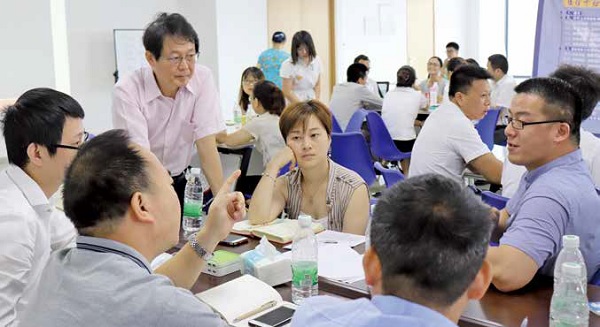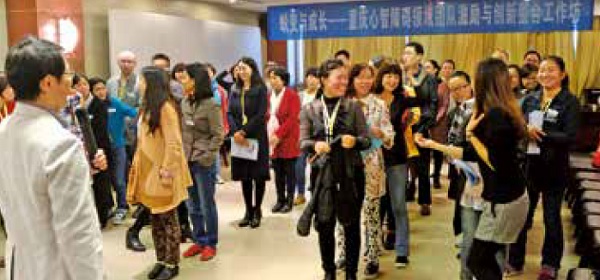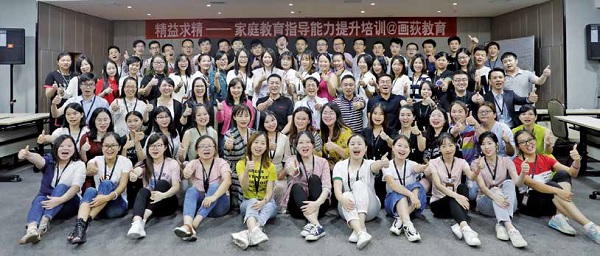Everything should be done to build people up
Coach Example Response
Picture/Chen Henglin

▲The author (leftist) listened carefully to the students' sharing in class, and demonstrated paying attention and listening with an attitude of teaching by example. Pictured is a corporate coaching course.
Example sharing and responses from training courses
In the original talent section of the 58th issue of this magazine, the author introduced the concepts, functions and different techniques of coaching. The 59th issue discussed cultivating talents from the perspective of coaching from the four perspectives of "recognizing people, educating people, employing people, and retaining people". However, how to apply the concept? There is a theoretical foundation, how to implement the technology and apply it? Are there any cases for reference and learning? In this issue, I will share responses to successful cases in different fields in the past few years across the Taiwan Strait and three places, from individuals or groups, including government departments, businesses, non-profit organizations, etc.
Response 1: Leadership training for state-owned enterprise senior executive coaches
1. Listening → Empathy → Stimulating potential → Motivation to move forward
Only by paying attention to listening can you solve problems; empathy can be applied in communication with employees; stimulate employees' potential and become the driving force for progress. After stimulating the potential of the team and individuals, each can leverage their strengths and enhance their interests. Help employees think deeply, clarify problems, come up with solutions and use them in their jobs. After seeing the results, they will be encouraged and continue the positive cycle.
2. Set goals→step by step→achieve good results
The impossible becomes possible, disbelief becomes belief. Set goals step by step, step by step, and ultimately achieve better results. Turn big goals into several small goals to complete; everyone has unlimited potential and needs to be stimulated to be unleashed; everyone also needs appreciation, and the huge power of appreciation cannot be ignored. Trust each other, encourage and appreciate each other, and be a leader. Lead by example, improve leadership skills, strengthen communication, and manage employee emotions with empathy.
3. Life application → Active communication → Feedback and gratitude
Applying the methods taught by teachers to all aspects of life, not only in the workplace, but also in active and effective communication with family members, it feels great to receive unexpected feedback! Even though the method I use now is still unfamiliar and rigid, I think as long as I continue, it will definitely bring a new experience to my life. Thank you very much for taking this course.

▲Students who participated in the course realized through listening, discussions and examples that "workers come before work", and only then can employees feel happy at work. The picture shows the coaching leadership course for senior executives of state-owned enterprises.
Response 2: Practical application of corporate coaching leadership
A case of a business owner who is engaged in education and participated in a professional coach certification class. After obtaining the professional coach certification, he actually applied coaching leadership within the company. The following is her work practice written on "How to Enhance Employees' Work Happiness".
Workers’ experience before work
The internal management of enterprises has always advocated "people-oriented". Maslow's humanistic theory mentioned that after survival needs are met, needs at various spiritual levels will enter. The enterprise not only meets the survival needs of employees, but also pays attention to spiritual needs. This is the magic weapon that has been explored in enterprise management methods. Employees have a sense of happiness at work and continue to work hard, which is the key to the enterprise's everlasting business. Top priority.
In 2018, Mr. Chen Henglin’s course changed my thinking from focusing on performance first to caring more about people. After more than a year of study, Teacher Chen pays careful and thoughtful attention to every student before, during and after class, and teaches by precept and example, allowing me to see what is people-oriented: respect, appreciation, encouragement, help, Accept.
Learn to convey happiness in the classroom, and bring this intention to company employees, and happiness will naturally arise. What I use most in my company is appreciative feedback, which comes in various forms, such as: 1) Employees give appreciative feedback to each other in the work group once a week based on specific actual facts; 2) Teachers treat students Give more positive encouragement and use appreciative feedback; 3) When communicating with customers or accepting opinions, use appreciative feedback; 4) When employees work hard to achieve every small goal, I give appreciative feedback in a timely manner; 5 ) Use the language of appreciative feedback whenever and wherever possible.
The results after half a year of application: 1) Employees are stable this year and no one has resigned; 2) The relationship between employees has become closer, they understand and care about each other, encourage each other, have a positive attitude, and are willing to give. I can feel the happiness at work and be full of gratitude; 3) Customers and students are satisfied with the services provided, and the complaint rate has been reduced by 90% in half a year; 4) The relationship between me and my employees has improved, we appreciate each other, and management is easy Efficient and more likely to reach consensus when there are disagreements at work.
I especially benefited from Dr. Chen's "Coaching Leadership" course and the teacher's personal influence, and continued to practice the various leadership qualities I learned in my work. Thanks to Teacher Chen for your earnest teaching, and grateful to have met a good teacher!

▲Parents in the team motivation workshop in the field of mental disabilities said that to experience change, you must first understand yourself. The picture shows a practical exercise of team motivation.
Response 3: Communication technology training for parents of autistic children in non-profit organizations
Understand cognition and change yourself
Student Yang from Jinan: "In 2008, I found out that my son was suspected of being autistic (or autism), and I have been running around seeking help for him. I can't remember how many classes I have attended and how many roads I have traveled. What has benefited me the most is This course is truly transformative: 1) Start by changing your cognition; 2) Bring out motivation through change; 3) Improve your ability to reduce stress and solve problems; 4) From changing others to changing yourself.”
Student Yang from Haikou: "Everyone has a temper. There were times when I couldn't control it before. When I found that my child started to imitate me, I made up my mind to change it. In fact, I found that I had changed a bit, and my child's mood gradually stabilized. He and I The parent-child relationship is getting better and better.”
Shanghai King Student: "What I have learned in just three days is: 1) I understand that my husband needs my praise, encouragement, recognition and care. Before, I put all my energy on my two children and parents, neglecting the backbone of the family. ”, I feel very guilty; 2) Learn to accept the other person and think more from the other person’s perspective, so that communication will be smooth and pleasant, and will not bring pressure to each other; 3) Know yourself, your own problems and needs, and learn Independence, and planning life goals.”

▲The author (middle of the third row) holds different coaching workshops in three places on both sides of the Taiwan Strait. In addition to his own professionalism, he also relies on God’s revelation in the word. With the power God gives him, he can do everything.
Words come from the inspiration of the Holy Spirit
During the teaching and consultation process, the words of the Bible serve as my constant reminder: “Speak what is good for building up others according to the circumstances, so that it may benefit those who hear you.” (Refer to Ephesians 4:29) “The wisdom of the wise But the tongue is medicine for healing.” (Refer to Proverbs 12:18) Use words of wisdom to build up the client, and the effect of helping others is that “good words are like honeycombs, sweetening the heart and healing the bones.” (Proverbs 16:24)
Often in consultations or daily conversations, because of the inspiration or revelation from the heart, blurt out words that can trigger the client's reflection and awareness, and then lead to action and change, just as the scripture says: "Because at that time the Holy Spirit will teach you "He who is sent by God speaks the words of God, for God gives the Holy Spirit without measure." (John 3:34)
As a workplace minister, I bring my faith into my profession and my profession into my faith. Whether it is teaching and service in universities, training in companies, or courses in certification classes, etc., I know clearly that what I say and do, on and off the stage, in the workplace and in life, if Any influence I can bring is because "I can do all things through Christ who strengthens me." (Philippians 4:13)
Dr. Chen Henglin, is an associate professor at Kunshan University of Science and Technology in Taiwan and the founder and dean of Peiying International Coaching Leadership Academy; he has a counseling psychologist certificate and a coaching qualification from the California government certification organization.
